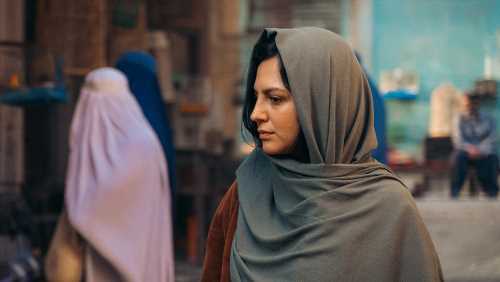Benito Zambrano’s “Jumping the Fence” joins Roya Sadat’s “Sima’s Song,” and Pau Calpe’s “Werewolf” in the lineup of Spanish Screenings Goes to Cannes, a selection of five pix in post which underscores the ever broadening compass – in genre, setting, protagonists, production bases and models – of film production in Spain.
“Sima’s Song,” for example, is set in 1979 Kabul, “Jumping the Fence” on the Morocco-Spain border in Africa.
Many titles, though still in post production, come laden with prizes as projects, prestige deals or rich talent. “Sima’s Song,” from Afghan director Roya Sadat, whose “A Letter to the President” was shortlisted for an Oscar, won the Taicca Award at Busan’s Asian Project Market and the IFI-Pas Award at Mumbai’s Film Bazaar. Its producer, Alba Sotorra, was nominated for an International Emmy as a director for “The Return: Life After ISIS.”
The second feature from Orr, whose “Niñato” marked him out as a talent to track, “To Our Friends” scooped the top plaudit at Ventana Sur’s Proyecta project forum in December 2021. It’s also backed by enterprising Canary Island production outfit El Viaje Films, (“Slaughterhouse,” “White and White,” “They Carry Death”).
“Werewolf” marks the latest title from producer and now writer-director Pau Calpe (“Tornarem,” “Tros”) whose career has mixed genre (“Hipnos”), social drama (“Canço per a tu”) and their mixture, as in “Tros” and now “Werewolf.”
Starring two of Spain’s best actors of their generation, Carmen Machi (“Piggy”) and Antonio de la Torre (“The Endless Trench”), “We’ve Always Treated Women Too Well” is an Amazon Prime Video pickup. “Jumping the Fence” is backed by Castelao, part of Spanish indie studio Filmax.
Four of the five movies are co-produced with French partners, two with Paris-based Noodles Production, as international co-production becomes the default model for arthouse films of ambition the world over.
The real boundaries to break are, however, those of the mind. “Jumping the Fence” offers empathy with a Spanish immigrant, Ibrahim, from Guinea Conakry, although he comes to feel that Madrid is his home. “Sima’s Song,” all the more remarkably, underscores “the power of friendship to break down ideological barriers,” says producer Sotorra.
If its execution matches up to its premise, it could be one of key Spanish productions being brought onto the market at this year’s Cannes.
The five titles in more detail:
“Jumping the Fence,”(“El Salto,” Benito Zambrano, Cine365 Films, Castelao Productions, Noodles Production)
The latest from Zambrano, director of fine, moving dramas such as “The Sleeping Voice,” a “social thriller,” say its makers, turning on Ibrahim who has a home, partner, Mariama, and work in Madrid. Suddenly deported, he reckons the only way back is to jump the fence from Morocco into Spanish protectorate Melilla, a challenging physical feat. A title to track.

“Sima’s Song,” (“La Canción de Sima,” Roya Sadat, Alba Sotorra SL, Baldr Films, Urban Factory)
A “drama thriller” shot in Farsi and Russian, set in 1979 pre-Civil War Kabul, and inspired by a real story, the tale of two women – Suraya, a communist, Sima, a conservative – whose friendship endures despite radically opposing political views. “The film addresses themes that will capture the attention of international audiences, such as ideological clashes, feminism, and the power of friendship as a tool to break down ideological barriers,” says producer Alba Sotorra.
“To Our Friends,” (“A nuestros amigos,” Adrian Orr, El Viaje Films, New Folder, Karõ Filmes)
A coming of age film, filmed over four years in collaboration with its young protagonists, immersing the audience in their stories, struggles, and desires. “The film leads us to rethink both identity and the human ties that define us as a society,” says producer Jamie Weiss. Winner of Ventana Sur’s Proyecta project competition in 2021. There it weighed in as a feature exploring resonant questions of identity and social class of a generation born in a big city’s humbler outskirts, tracking Sara, her friends in Madrid’s Carabanchel, first love and university life.

“We’ve Always Treated Women Too Well,” (“Tratamos demasiado bien a las mujeres,” Clara Bilbao, Ficción Producción, Noodles Production)
An unusual play in Spain’s current movie panorama, a satirical tragicomedy set in post Civil War 1945 as the Spanish resistance takes over a mail office in the Pyrenees. But they hadn’t reckoned on coming up against the redoubtably patriotic Remedios Buendía. Carmen Machi and Antonio de la Torre lead a fine cast. “A clearly black comedy, with a remarkable screenplay by Miguel Barros, integrating humor to narrate a truly tragic story,” says Bilbao, a multi Goya winning costume designer-turned-director. A Prime Video and RTVE pickup for Spain.

“Werewolf,” (Pau Calpe, Galápagos Media)
Adrià lives from town to town with his brother, is mute, hates closed spaces, and at full moon smells blood, A coming of age, adult and realistic reinterpretation of the werewolf myth, says producer Nati Escobar. “Adrià’s character is a metaphor for those who are different. The film is about how they are stigmatized,” she adds. Set up at burgeoning Barcelona-based production house Galápagos Media (“Yuli,” “Tros,” “Cançó per a tu”).

Spanish Screenings Goes to Cannes is a programme presented by the Málaga Film Festival, Spanish export/inward investment board ICEX Trade and Investment and its ICAA national film agency.
The Cannes Screenings form part of Spain’s selection as the Marché du Film’s 2023 Country of Honor. A four-prong year-round initiative, including Malaga’s Spanish Screening Content and the Spanish Screenings Finance & Tech at San Sebastián, the Screenings are financed with Next Generation EU Funds as part of the post-pandemic Spanish Recovery Plan (PRTR).
Read More About:
Source: Read Full Article
